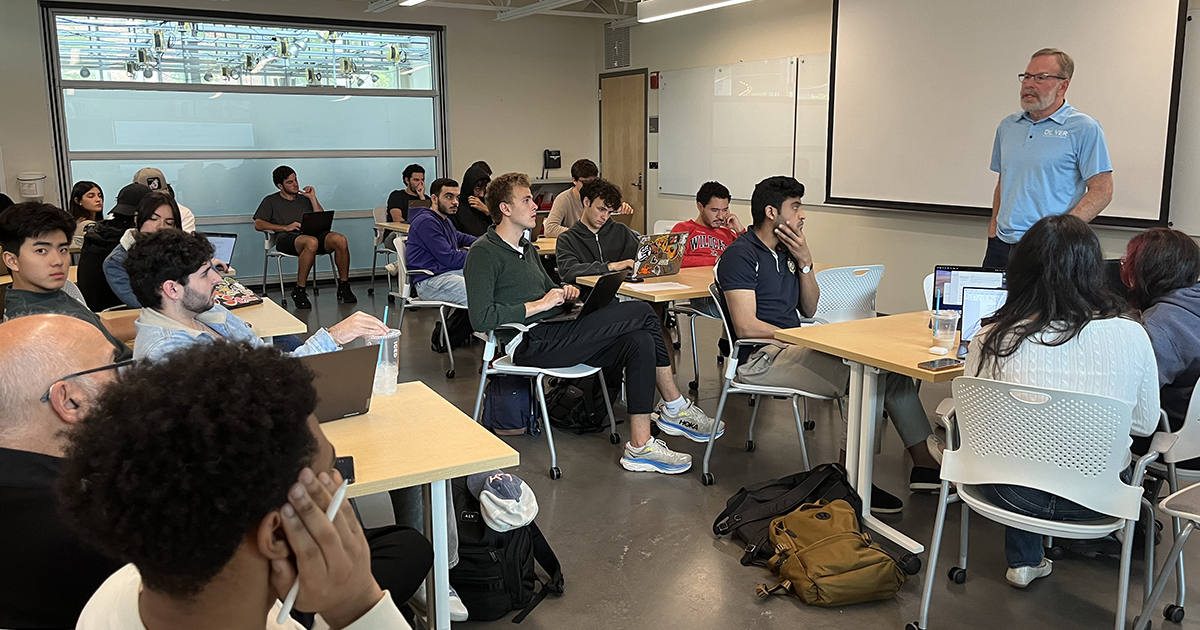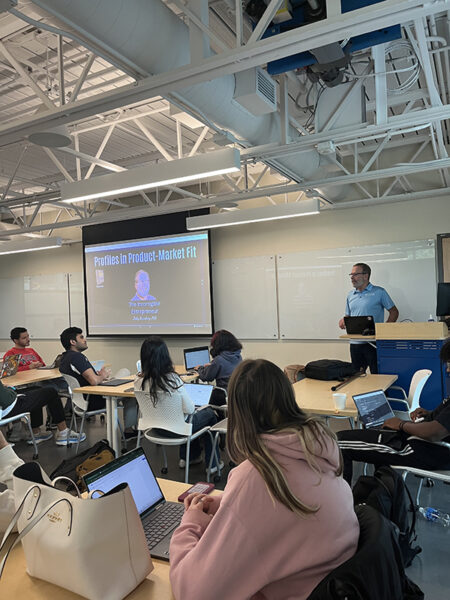Lessons from Jothy Rosenberg: Product-Market Fit, Adaptability, and Team Building

Editor’s note: The New Tech Ventures Blog is produced by students in the New Technology Ventures course, taught by Assistant Professor of Practice Stephen Brand. The course features tech leaders and entrepreneurs as weekly guest speakers, and students are sharing their insights on the ventures and the experience. This post was written by the team of Pratyay Agrawal ’24, Deepali Joshi ’26, Janya Mehra ’25, Shivani Shah ’25, and Aditi Vinod (Olin). See a PDF version of this blog post below.
In our latest New Tech Ventures session, we had the privilege of learning from Jothy Rosenberg, a seasoned entrepreneur whose remarkable career spans multiple startups, groundbreaking research with NASA, and impactful nonprofit work.
Rosenberg’s story is one of resilience, adaptability, and perseverance, giving us invaluable insights into what it takes to thrive in today’s fast-paced entrepreneurial landscape. His talk focused on the importance of product-market fit (PMF)—the cornerstone of every successful startup—and was filled with lessons from both his triumphs and failures.
Here are some of the key insights from Rosenberg’s session:
The Significance of Product-Market Fit
Rosenberg drove home one major point: No startup has ever succeeded without proving product-market fit early. Drawing from his own experience, he made it clear that a great product alone is never enough. The market must need the product.
One of his earlier ventures, Service Integrity, failed because although they had a well-engineered solution, there was no market for it. This example highlighted how crucial it is to identify a problem worth solving. Rosenberg’s story about Service Integrity became a cautionary tale for all of us, emphasizing that without a clear market need, even the best technology will falter.
Perseverance and Pivots
One of the most valuable takeaways from Rosenberg’s journey was his ability to pivot when necessary. A shining example was his company WebSpective, which developed load distributors to prevent high-traffic websites from crashing. WebSpective’s technology was not only successful but was eventually bought for $106 million by Inktomi and later acquired by Yahoo.
However, not all of Rosenberg’s ventures were successful right away. His company Dover Microsystems, a hardware-based cybersecurity firm, faced significant challenges. But, instead of abandoning it, Rosenberg and his team rebooted the company, demonstrating his perseverance and adaptability—traits that are integral to long-term entrepreneurial success.
The Power of a Strong Team

Another important topic Rosenberg covered was the need to build the right team. He stressed that the first 25 employees should be people you already know and trust. His philosophy was built around fostering a trust-based, politics-free environment. This piece of advice aligns with one of his other key lessons: hire slowly, fire quickly. Keeping the wrong person on a team for too long can be detrimental to company culture and overall progress. Rosenberg’s focus on strong team dynamics was a reminder that even the most innovative ideas can’t succeed without the right people behind them.
A Greater Cause
Beyond his entrepreneurial ventures, Rosenberg also discussed his philanthropic work. He is the founder of the Who Says I Can’t Foundation, a nonprofit dedicated to empowering people with disabilities to achieve their goals through physical activities like skiing and biking. Having lost his leg to cancer at a young age, Rosenberg is a strong advocate for overcoming adversity. His foundation helps individuals find strength in challenges, much like he has in his own life and career. His passion for helping others echoed throughout his talk, reminding us all of the importance of giving back and using success for a greater cause.
Failure as a Learning Tool
A recurring theme in Rosenberg’s talk was the importance of failure as a learning tool. He openly shared how several of his ventures failed, but each failure brought new insights that helped him in his subsequent efforts. His experience with Service Integrity highlighted the importance of identifying a clear market need before pouring resources into a product. His resilience in the face of failure and his ability to quickly pivot in new directions stood out as some of his most admirable traits. These are the skills he believes every entrepreneur should hone—facing failure head-on and using it as a stepping stone toward eventual success.
Building Resilient Ventures
Rosenberg emphasized that entrepreneurship is not just about innovation but also about adapting and persevering. His advice on proving product-market fit, building the right team, and staying resilient in the face of challenges left us with a robust framework to apply to our own ventures. We learned that product-market fit is non-negotiable, and even the best product will fail without a market that needs it. But more importantly, Rosenberg’s story showed us that with the right mindset, failures are not the end—they’re just the beginning of something greater.
Conclusion
Jothy Rosenberg’s talk went beyond just business strategies; it delved deep into the resilience and mindset needed for entrepreneurial success. His willingness to share both his triumphs and failures created a learning environment that was as inspiring as it was educational.
For us, the key takeaways were clear: product-market fit, adaptability, and team building are the pillars of a successful venture. And, as Rosenberg showed us, the journey is as much about overcoming personal challenges and giving back as it is about business victories.
This session reminded us that entrepreneurship is not a linear path—it’s filled with pivots, failures, and new opportunities. But with the right mindset, every challenge becomes an opportunity for growth.
Posted in New Tech Ventures Blog






